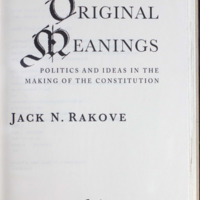-
Title
-
Original meanings : politics and ideas in the making of the Constitution
-
Description
-
What did the U.S. Constitution originally mean, and who has understood its meaning best? Do we look to the intentions of its framers at the Federal Convention of 1787, or to those of its ratifiers in the states? Or should we trust our own judgment in deciding whether the original meaning of the Constitution should still guide its later interpretation? These are the recurring questions in the ongoing process of analyzing and resolving constitutional issues, but they are also questions about the distant events of the eighteenth century. In this book, Jack Rakove approaches the debates surrounding the framing and ratification of the Constitution from the vantage point of history, examining the range of concerns that shaped the politics of constitution-making in the late 1780s, and which illuminate the debate about the role that "originalism" should play in constitutional interpretation.In answering these questions, Rakove reexamines the classic issues that the framers of the Constitution had to solve: federalism, representation, executive power, rights, and the idea that a constitution somehow embodied supreme law. In each of these cases, Original Meanings suggests that Americans of the early Republic held a spectrum of positions, some drawn from the controversial legacy of Anglo-American politics, others reflecting the course of events since 1776, the politics of the Federal Convention, or the spirited public debate that followed.
-
Identifier
-
595829
-
394578589
-
Creator
-
Rakove, Jack N
-
Format
-
1st ed.
-
Source
-
Brian Lamb Booknotes Collection
-
Gift of Brian Lamb, 2011.
-
Catalog record
-
Language
-
eng
-
Date
-
1996
-
Program air date: July 6, 1997
-
Publisher
-
A.A. Knopf
-
George Mason University. Libraries. Special Collections & Archives
-
Text
-
Transcription of Annotations
Notes on front endpapers: Montesquieu: The Spirit of the Laws; David Hume: Idea of a perfect commonwealth; William Blackstone: Commentaries on the laws of England; John Locke. Popular Sovereignty. Non-signers: Elbridge Gerry, George Mason, Edmund Randolph. Daniel Rakove p 382. Fabius--John Dickinson. Publius--Madison and Ham. A Landholder-Ellsworth. A Countryman-Roger Sherman. p. 137. Cato, Centinel, Brutus, Pacificus (Ham). Madison and the 'volatile forces of passion' p. 144. 'Patron saint of American history.' Unbiased history-'an elusive goal.' 'Originalism' what is it. How much of a Nationalist was Madison. Why would historians like to be in chamber June 18, 1787. To hear Alexander Hamilton? p 64. Virginia Plan; New Jersey Plan. Anti-Federalists--fundamental objectives p 147. How did framers deal with Slavery. How many attended; How many signed; who didn't. Notes on front fly sheet: Committee of Style. Jefferson meant for Declaration to be read aloud p 342. Framers/ratifiers; Madison/Hamilton (Helvidius/Pacifius); great collaborators turned protagonists. What is the necessary and proper clause. Madison's theory of faction. Madison allies: James Wilson (Pa), A. Ham. (NY), Rufus King (MA). Committee of detail: John Rutledge, Oliver Ellsworth, Edmund Randolph, Nathaniel Gorham, James Wilson. Compromise. *All politics are local p 29. *The Madisonian Moment p 36. Notes on back endpapers: 1 Presidency--only two terms; 2. Senate-elected directly by people; 3. Court--Roe v. Wade, Brown v. Board of Education; 4. Line item veto; 5. Balance Budget Amendment; 6. Vietnam War. Underlinings/Notes: Underlinings: meaning, intention, understanding. Influences on Constitution, background of founders, compromise. Lamb underlines references to historians such as Onuf and Pocock. Notes: "Legal case," "undergraduates," "baklava," "Madison!" "Hannah Arendt," "Madison notes, etc.," "progressives," "conservatives," "2000 actions," "all politics was local," "Shay's Rebellion," "Princeton 1792," "State couldn't be trusted," "interests," "May 14 opening day," "Virginia Plan," "Madison allies," "Wilson, Hamilton, King," "one branch, equality of states, the Senate," "Hamilton's famous speech," "June 18," "Senate," "slaves," "non-signers, veto," "Sept 15, slavery," "sacrifice on slavery for compromise," "Delaware, New Jersey, Georgia, Penn., Maryland, S. Carolina," "Bill of Rights," "June, N.H. became 9th state," "final debate June 24-25," "June 25, 1788 N.Y., N.C., R.I. still out," "Aug 2," "Nov '89 ratified," "R.I. May 1790," "debate over ratification," "one irony," "WASH and Franklin," "public debate, pseudonymous," "Gerry, Mason, Randolph, Martin," "not turn on merits," "passions," "second convention?" "Anti-Federalist legacy," "Anti-Federalist attack," "Fed 39," "Luther Martin, James Wilson," "national v. states," "national payment for Senators and Reps.," "judicial review," "taxation," "taxation great engine of tyranny," "standing army," "Geo. WASH.," "Rights-talk," "Robert Bork," "2 phases," "Powell 1985," "primary sources."
-
Subject
-
"Constitutional history--United States."
-
"Constitutional law--United States."
-
Relation
-
Original Booknotes interview
-
Rights
-
This work may be protected by copyright laws and is provided for educational and research purposes only. Any infringing use may be subject to disciplinary action and/or civil or criminal liability as provided by law. If you believe that you are the rights-holder and object to Mason’s use of this image, please contact speccoll@gmu.edu.
 595829.pdf
595829.pdf